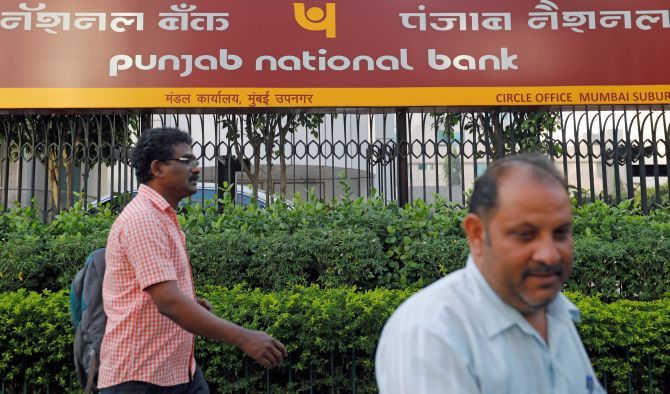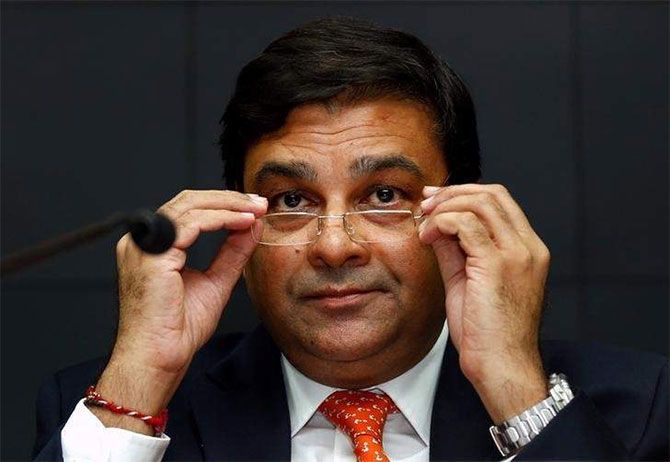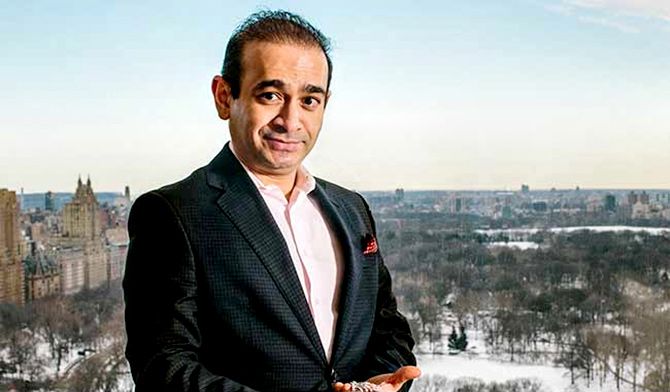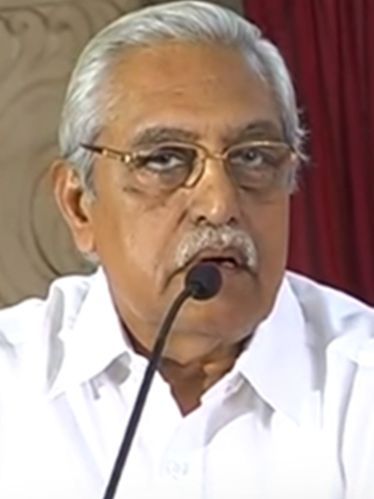'In India, people save for their children's education or a daughter's marriage or for old age.'
'This is not America or Japan, this is India.'
'This is a conservative society and what we need is more regulation to safeguard and guarantee people's money.'

IMAGE: 'Representatives of the RBI are on all the boards of public sector banks and they know very well that Indian banks are giving loans to the gem and jewellery industry in unusual proportions in the last few years.'
'The RBI should have checked why there was this unusual increase in loans to this industry. But it didn't,' says C H Venkatachalam, general secretary, All India Bank Employees Association.
Photograph: Danish Siddiqui/Reuters
With jewellers Nirav Modi and Mehul Choksi ensconced overseas, India is faced with yet another long of judicial and extradition proceedings to bring them back to face trial over their involvement in the Rs 12,400 crore letters of undertaking fraud in the Punjab National Bank.
Even as the multi-agency investigation into the scame is under way, C H Venkatachalam, general secretary of the All India Bank Employees Association, is clear in his mind about who is responsible.
"This government wants to bring in the FRDI bill in Parliament. This is going to cause unnecessary panic in the minds of people. It will also affect the confidence people had in public sector banks. If they feel banks are not safe, where will they keep the money?" Venkatachalam, below, asks Rediff.com's Shobha Warrier.
Banks are audited internally and externally regularly. How come a scam of this magnitude was not detected by anyone?
The Reserve Bank of India doesn't audit all the branches in the country; only a few branches are selected randomly.
It is definitely the fault of concurrent auditors who are external auditors not to have found a scam like this.
The practice of the chartered accountants is that they send their apprentices who do bank branch auditing like routine work.
Earlier, the RBI appointed external auditors from a very efficient panel of auditors. After liberalisation, the selection of auditors was transferred to the banks which is a serious flaw.
Only when somebody from outside checks, faults are detected. But when the banks themselves appoint the auditors, the result is also on expected lines.
This flaw was pointed out at that time itself to the government by us, but they were of the opinion that it was not necessary for the RBI to appoint the auditors.
If you look at the PNB scam, one branch gave a letter of undertaking in Mumbai based on which the foreign branches of other public sector banks gave advances to Nirav Modi to import.
When they do so, the loan amount is credited to the Punjab National Bank only as it is a nostro account.
A nostro account is the record of the bank whose money is at another bank and they are often used to simplify trade and foreign exchange transactions.
The LoUs were not shown up by the software...
Even more shocking was that the password which was supposed to be a secret was shared by everyone in the branch.
It is said that even the companies owned by Nirav Modi had this password.
If this was what they were doing, what kind of banking is this? It is a total failure of banking itself.
Also, the nostro account is a very sensitive account and supposed to be under the watch of the foreign exchange branch, the head office of the bank and even the RBI.
Then, how come nobody noticed the fraud?
Either it is corruption or it is negligence.
First of all, a junior officer in a branch had no authority to give a LoU to the Nirav Modi company. Even if he had done this, somebody senior should have checked the mistake.
It is surprising that after accepting the LoU, the foreign branch had written a letter acknowledging and conforming that on the basis of the letter, they were giving credit.
This kind of a confirmation letter goes to the top official of the branch and not to any junior officer. All this needs to be investigated.

IMAGE: RBI Governor Dr Urjit Patel. 'The RBI governor has not even opened his mouth so far about the scam. Why do we need such a Reserve Bank governor? Let him go,' says C H Venkatachalam. Photograph: Reuters
You had said the RBI should take responsibility and the RBI governor should quit?
The Reserve Bank is the banker of all banks. They are the custodians of the money of all the people.
They are supposed to regulate and if they are not regulating banks, what is the point in having the Reserve Bank of India?
The job of the police is to catch the thief and if they can't do it, there is no need to have the police station.
I would say the Reserve Bank of India thoroughly failed in its job.
Representatives of the RBI are on all the boards of public sector banks and they know very well that Indian banks are giving loans to the gem and jewellery industry in unusual proportions in the last few years.
The RBI should have checked why there was this unusual increase in loans to this industry. But it didn't.
So, the RBI should take moral responsibility for a scam of this proportion.
When a rail accident happens, you ask the railway minister to resign. In this case, the RBI has failed completely in the overall supervision of banks.
The RBI governor has not even opened his mouth so far about the scam. Why do we need such a Reserve Bank governor? Let him go.
I am very clear in saying that the RBI should take moral responsibility and the RBI governor should go.
What about the finance ministry?
Nirav Modi is not an unknown man. The finance ministry is also periodically reviewing all the banks. And this government has been frequently questioning the banks on their work.
After all, the government gave capital to all the banks after the NPAs (non performing assets) were made public.
Before recapitalisation, the government had asked the banks all the details like the balance sheet, performance, etc. They could have found out a fraud of this magnitude at that time.

IMAGE: 'Nirav Modi is not the origin of the scam; he is the end of the scam,' says C H Venkatachalam. Photograph: Kind courtesy Nirav Modi/Facebook
Do you also hold the government responsible for this fraud?
In a sense, they were irresponsible in not knowing what was happening in a bank.
I am not saying that the government would know what was happening in every branch, but they should have noticed when loans were given to a particular sector in such large proportions.
The government cannot micro manage things, but at the macro level, they should have known.
The finance ministry and the industries ministry should have noticed that Indian banks were getting over exposed to the gems and the jewellery sector.
That is why we ask for a CBI enquiry on this fraud. More than that, there has to be a thorough probe on the banking sector itself by a Joint Parliamentary Committee.
We feel there is definitely something murky in the system. Will anyone believe that Nirav Modi will go to a branch and bribe a low-level officer?
Just look at the people with whom he had moved around. He is not the origin of the scam; he is the end of the scam.
The government says the scam started when the UPA was in power...
Okay, it must have started then. That doesn't absolve you of anything.
You came in 2014. What did you do in the last four years?
Another thing is, not only Punjab National Bank but other banks also gave loans.
When you take a loan from a bank, you give all the details of your other loans too.
The banks are supposed to ask questions before giving loans amounting to crores of rupees. They are supposed to look into all the business transaction of his accounts. Why didn't they do it?

There is talk about privatising public sector banks to stop such scams. Is privatising PSBs the answer?
Absolutely not. I condemn the demand itself.
There are two sides to all the scams and frauds. Who is on the other side? The private sector.
When that is so, how can you criticise the public sector alone?
Today, the government suspects fraud in the Rs 9 lakh crore NPA. We at the AIBEA have been shouting that there was a possibility of fraud and corruption in the whole business of NPAs.
Who are the defaulters? All from the private sector. Is the name of any public sector organisation in the list of defaulters? No.
Is it a good idea to assess all bad loans above Rs 50 crore?
In fact, we have been demanding an assessment of all loans above Rs 10 crores!
When a loan above Rs 10 crore becomes bad, it has to be probed.
Do you think recapitalisation of PSBs will solve the NPA problem?
The Basel norm is that banks have to have backup capital to support the loan. It is to support the bank in case it collapses which is basically meant for private banks. So, recapitalising public sector banks should not be looked at in the same context.
Private capital of a bank and government capital is different.
The capital of all the 20 public sector banks put together is only Rs 22,000 crores (Rs 220 billion). On the other hand, we give loans worth Rs 75 lakh crores (Rs 7.5 trillion). So, capital in government banks has no meaning.
Why do you have to recapitalise banks? It is only to adhere to international norms that the government gives more capital to banks. Otherwise, it has no meaning.
Some time back, three public sector banks had negative capital yet people did not rush to withdraw all the money because people knew the government would take care of the banks. Had this happened to a private bank, people would have panicked.
Do you think after all these mega scams, the public has lost trust in public sector banks?
Yes, there is confusion and panic in the minds of people. After hearing about bad loans, people now feel that such banks will not function after some time.
When you hear about scams as big as Rs 14,000 crores (Rs 140 billion), the public tends to wonder about the fate of their savings.
Now the government is coming with the Financial Resolution and Deposit Insurance Bill 2017 in Parliament, which says if any bank gets liquidated, the RBI would use people's deposits to save the bank from liquidation.
This has created panic in the minds of people. It means the government will not bail out the banks, instead it will use people's money.
In 1960, when T T Krishnamachari was the finance minister, the AIBEA president raised the issue of many private banks in India collapsing at that time. It was after that Section 45 of the Banking Regulation Act was added as a special amendment.
Under the amendment, the government can tell the RBI to close the bank and merge it with another bank. So, from 1960, no bank has been liquidated in India.
Around 30 to 40 private banks collapsed later, but they were not liquidated; they were taken over by another bank.
But now, this government wants to bring in the FRDI bill in Parliament. This is going to cause unnecessary panic in the minds of people.
It will also affect the confidence people had in public sector banks. If they feel banks are not safe, where will they keep the money?
Is to force them to put all the savings in mutual funds and the share market?
The government should understand that the savings of the people are the social capital for the country's development.
If social capital goes into the share market for speculation, not only the individual but the country is also taking a big risk and it is very dangerous.
In India, people save for their children's education or a daughter's marriage or for old age.
This is not America or Japan, this is India.
This is a conservative society and what we need is more regulation to safeguard and guarantee people's money.
But this government wants to make India a gambling den. That's why we feel the government must change its economic policies.









 © 2025
© 2025